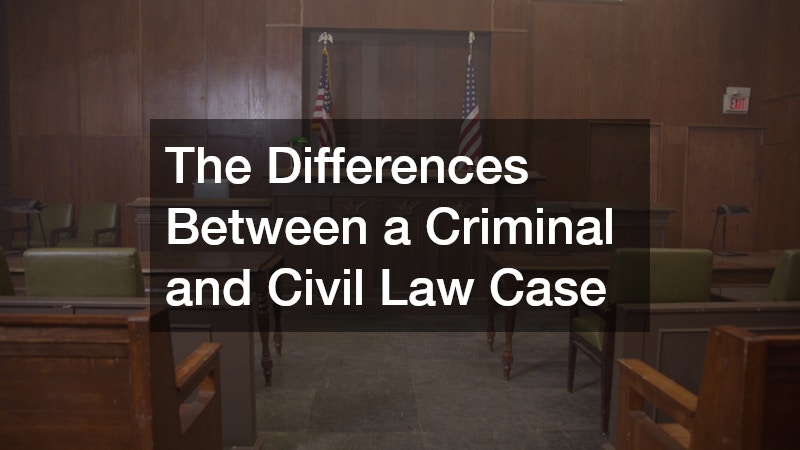Understanding the distinctions between criminal and civil law cases is essential for anyone navigating the legal system. While both types of cases involve disputes that may require resolution through the courts, the objectives, procedures, and outcomes differ significantly. For individuals seeking guidance, accessing criminal law resources can provide crucial insights into how criminal cases are handled and what legal protections are available.
Purpose and Objectives
The fundamental difference between criminal and civil cases lies in their purpose. Criminal cases are designed to protect society by addressing actions considered offenses against the state or public.
Prosecutors bring these cases on behalf of the government, aiming to punish the offender and deter future wrongdoing. Civil cases, on the other hand, focus on resolving disputes between private parties, such as individuals or businesses. The primary goal in civil law is compensation or restitution rather than punishment.
For those facing criminal charges, consulting criminal law resources can clarify potential consequences and the legal processes involved. These resources often provide information on criminal statutes, sentencing guidelines, and defendants’ rights, helping individuals make informed decisions about their case.
Parties Involved
Another key difference is the parties involved. In criminal cases, the state or government acts as the prosecutor, while the defendant is the individual accused of committing a crime. Civil cases involve a plaintiff, who brings the complaint, and a defendant, who is alleged to have caused harm or breached a legal duty. This distinction affects how cases are filed, argued, and adjudicated.
Accessing reliable criminal law resources can be invaluable for understanding the roles of each party in a criminal case, the legal strategies used by prosecutors, and how defendants can protect their rights. These resources often include information on how criminal charges differ by jurisdiction, which is crucial since laws can vary significantly between states.
Burden of Proof
One of the most significant differences between criminal and civil cases is the burden of proof. In criminal law, the prosecution must prove the defendant’s guilt “beyond a reasonable doubt,” which is a high standard designed to protect individuals from wrongful convictions. Civil cases, in contrast, use a “preponderance of the evidence” standard, meaning it is more likely than not that one party’s claims are true. This lower threshold reflects the different stakes involved, as civil cases typically concern financial or property disputes rather than criminal punishment.
Consulting criminal law resources can help defendants understand what evidence is required for conviction and how the burden of proof may affect their defense strategy. These resources can also provide insight into procedural safeguards, such as the right to a fair trial, legal representation, and the appeals process.
Outcomes and Consequences
The outcomes of criminal and civil cases vary widely. In criminal cases, a guilty verdict may result in incarceration, probation, fines, or other penalties. Civil cases generally result in monetary damages or court orders requiring one party to take specific actions or refrain from certain behaviors. Importantly, a person found liable in a civil case is not subject to imprisonment, highlighting the difference in severity between the two types of legal proceedings.
Individuals facing criminal charges should turn to authoritative criminal law resources to understand potential penalties, sentencing ranges, and options for mitigating consequences. These resources can also provide guidance on navigating plea bargains, understanding criminal records, and seeking expungement where applicable.
Legal Representation
Legal representation is crucial in both criminal and civil cases, but the stakes in criminal cases often make competent counsel even more essential. A criminal defense attorney can advise on strategy, represent the accused in court, and negotiate with prosecutors. Civil cases also benefit from legal counsel, particularly in complex disputes or when significant financial interests are involved. Understanding the nuances of criminal law through criminal law resources can empower defendants to make informed decisions about hiring and working with legal professionals.
While both criminal and civil law cases involve legal disputes and courtroom proceedings, their purposes, parties, burdens of proof, and outcomes differ significantly. Criminal cases aim to punish offenders and protect society, requiring a high burden of proof and potentially severe consequences. Civil cases focus on resolving disputes and compensating victims, with a lower standard of proof and non-criminal remedies. By utilizing criminal law resources, individuals can gain a clearer understanding of the criminal justice system, their rights, and the options available to them when facing criminal allegations. Being informed is the first step in effectively navigating the complex landscape of the law.




